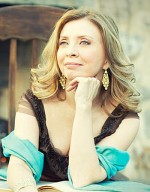Column Name
Title
Rondi Charleston is an expert at switching gears. At Juilliard she spent two years in the Drama Division (Group 9) before reaudtioning and enrolling in Vocal Arts, where she received her bachelor’s and master’s degrees in 1982 and 1983, respectively. After working as an opera singer for a few years, she decided to change course again and focus on jazz, but along the way she ended up becoming an award-winning television writer and producer. Journal editor-in-chief Susan Jackson squeezed in a phone interview with her during the week that her fifth solo CD, Signs of Life (Motema), was hitting the jazz radio charts and No Place on Earth, a documentary for which she co-wrote (with Fred Hersch) and performed the soundtrack, was opening nationwide. Charleston talked about the artistic environment in which she grew up, with her father, a jazz-loving English professor who taught his kids to be passionate about language; her mother, a singer and teacher who specialized in contemporary music; her brother, Erik Charleston (M.S. ’85, percussionist); and later her stepfather, the esteemed 20th-century composer Ralph Shapey. She also talked about how her circuitous route to acclaim had ended up making a lot of sense.
Body
Why did you make the switch at Juilliard from Drama to Vocal Arts?
I was in the Drama Division for two years, under Alan Schneider. I learned how to create an emotional connection to language, how to do Ibsen and Chekov, and how to become a storyteller, all of which has served me incredibly well. In Vocal Arts, I learned how to use the body, the breath, how to create resonance, and all sorts of essential technical things I still use today. So I have this very rich background. Juilliard has helped to create who I am today—I’m inventing new ways to use all these things I learned.
How did your move to journalism come about?
I sang professionally for a few years [after Juilliard] in bread-and-butter opera roles, but I was feeling a little hemmed in by the repertoire. I’d always wanted to be Aida, but I’m petite, and that wasn’t going to happen; it was clear that I was always going to be the maid, not the countess. I realized I needed to broaden my horizons artistically. I adored Charles Kuralt, and I started investigating the possibility of becoming a cultural reporter. I went to N.Y.U.’s journalism school, and while I was there, I won an award for a story unrelated to the arts, about Metro-North covering up the cause of a train crash. On the basis of that, Diane Sawyer hired me to work for her at ABC, and over the next few years we won an Emmy and a Peabody.
And then you went back to singing?
While I was working for Diane, I’d study jazz during my lunch breaks, and at night I started singing in small clubs in the Village. One night, Diane came to hear me and she said, ‘You know Rondi, I love working with you, but you’re really good at this.’ And that kind of gave me a green light to pursue singing.
Do you ever have regrets about your excursion into journalism?
I don’t. My worldview broadened considerably, and that has led me to writing some pretty interesting songs I might not have had I not had this experience of covering world events. I learned how to write and stick to a story line and not get distracted by unnecessary details. And journalism also made me a more well-rounded performer. Sometimes at Juilliard, your focus can get so narrow that you lose the big picture of why we need music in this world and that the point of making music is to create harmony between different cultures and religions and warring factions. The thing that holds music and journalism together for me is the constant search for the truth of things. I’m sort of like an archaeologist—no matter what the subject, whether it’s something being covered up in an investigative story or some secret meaning hidden in a song, I believe that if you dig deep and ask enough questions, you’ll discover one little kernel of truth. And that’s what excites me, sharing the excavation process with my listeners.
Do you think Juilliard has changed much since you were here?
If there had been a Jazz department when I was at Juilliard, I would’ve been in heaven! And the Vocal Arts department is more vibrant today than ever. I saw the production of Così fan tutte that Juilliard did with the Met last fall, and I was blown away by how these artists are synthesizing text and music—that’s what it’s all about. I think the level of training has really evolved and kept up with the times so that what you’re seeing now are singers who can not only act in a natural and believable way but are also truly invested in the text, not just the music.
Do you have any words of wisdom for today’s students?
Think in terms of creating your own career. Think like an entrepreneur—you can’t sit around waiting for the phone to ring. You’ve got to think in terms of collaboration and creating opportunities.
Do you think being an entrepreneur and an artist are compatible?
When I say entrepreneur, I really mean in terms of thinking—you have to be constantly thinking of new ways to expand artistic horizons in terms of collaborating with other artists, creating projects that are fresh and relevant, daring to draw outside the lines, and daring to think outside the box. When I was singing opera, all I could do was audition for certain roles, and I didn’t have much freedom to express myself artistically. So I had to find a way to make that happen. You have to take charge of your own career, not wait for other people to do it for you. Keep your curiosity alive and experience life—and don’t be afraid to ask questions!





